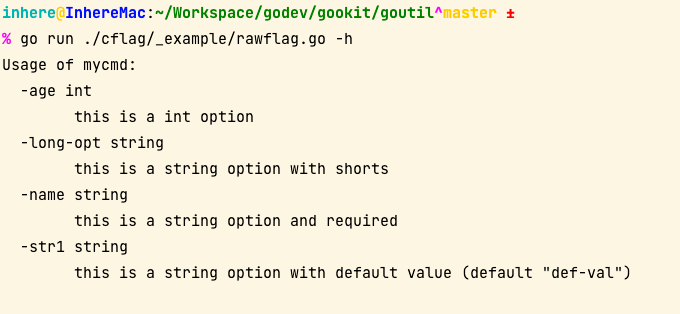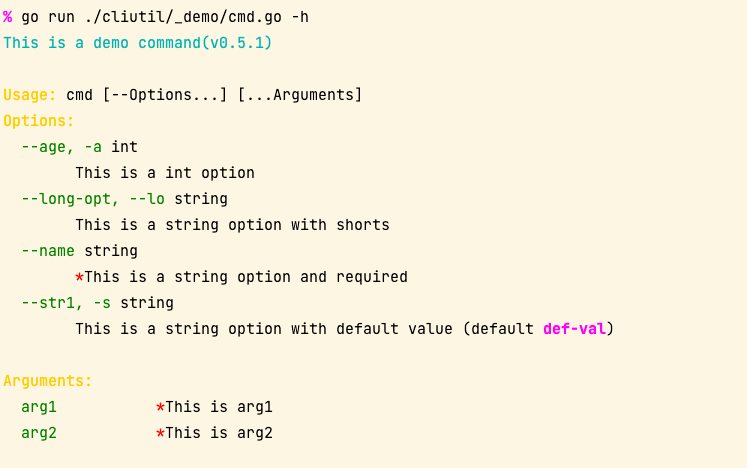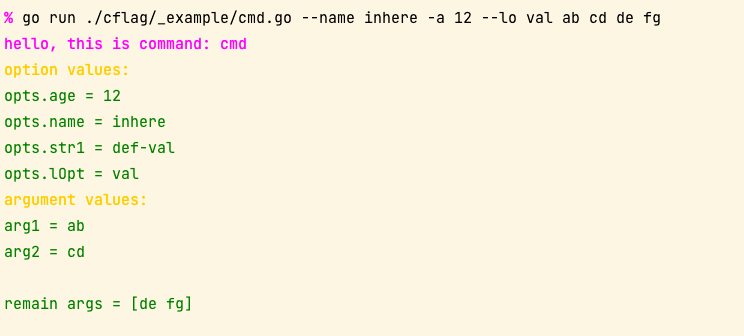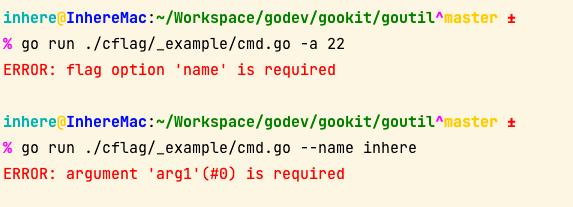cflag - wraps and extends Go flag build pertty CLI command
Use Go flag
Go flag is a package built into Go, and it is very easy to build a command application using the flag package.
cflag/_example/rawflag.go
package main
import (
"flag"
"os"
"github.com/gookit/goutil/cliutil"
"github.com/gookit/goutil/dump"
)
var opts1 = struct {
age int
name string
str1 string
lOpt string
}{}
// go run ./_example/rawflag.go
// go run ./cflag/_example/rawflag.go -h
func main() {
c := flag.NewFlagSet("mycmd", flag.ContinueOnError)
c.IntVar(&opts1.age, "age", 0, "this is a int option")
c.StringVar(&opts1.name, "name", "", "this is a string option and required")
c.StringVar(&opts1.str1, "str1", "def-val", "this is a string option with default value")
c.StringVar(&opts1.lOpt, "long-opt", "", "this is a string option with shorts")
err := c.Parse(os.Args[1:])
if err != nil {
if err != flag.ErrHelp {
cliutil.Errorln("Error:", err.Error())
}
return
}
// after parse, do something
handleFunc1()
}
func handleFunc1() {
cliutil.Infoln("after parse, do something")
dump.P(opts1)
}
Show help
go run ./cflag/_example/rawflag.go -h

Some problems
It's a package built into Go, and it's very simple to use. But there are some problems:
- Adding short options to options is not supported
- Does not support parsing subsequent parameter information
- Can't check if option is empty
- Rendering help information is very rudimentary
Use cflag
cflag - Wraps and extends go flag.FlagSet to build simple command line applications
- As easy as Go
flagto use - Supports auto-rendering of pretty help messages
- Allows adding short options to flag options, and multiples
- Allows binding named parameters
- Allows setting arguments or options as required
- Allows setting validators for arguments or options
Install
go get github.com/gookit/goutil/cflag
Usage example
cflag has the same binding option information as Go flag. At the same time, some additional information has been added, such as version, description, etc.
cflag/_example/cmd.go
package main
import (
"os"
"github.com/gookit/goutil/cflag"
"github.com/gookit/goutil/cliutil"
)
var opts = struct {
age int
name string
str1 string
lOpt string
bol bool
}{}
// go run ./_example/cmd.go
// go run ./cflag/_example/cmd.go -h
// go run ./cflag/_example/cmd.go --name inhere -a 12 --lo val ab cd
func main() {
c := cflag.New(func(c *cflag.CFlags) {
c.Desc = "this is a demo command"
c.Version = "0.5.1"
})
c.IntVar(&opts.age, "age", 0, "this is a int option;;a")
c.StringVar(&opts.name, "name", "", "this is a string option and required;true")
c.StringVar(&opts.str1, "str1", "def-val", "this is a string option with default value;;s")
c.StringVar(&opts.lOpt, "long-opt", "", "this is a string option with shorts;;lo")
c.AddArg("arg1", "this is arg1", true, nil)
c.AddArg("arg2", "this is arg2", true, nil)
// add handle func
c.Func = handleFunc
c.MustParse(os.Args[1:])
}
func handleFunc(c *cflag.CFlags) error {
cliutil.Magentaln("hello, this is command:", c.Name())
cliutil.Infoln("after parse, do something ...")
cliutil.Yellowln("option values:")
cliutil.Infoln("opts.age =", opts.age)
cliutil.Infoln("opts.name =", opts.name)
cliutil.Infoln("opts.str1 =", opts.str1)
cliutil.Infoln("opts.lOpt =", opts.lOpt)
cliutil.Yellowln("argument values:")
cliutil.Infoln("arg1 =", c.Arg("arg1").String())
cliutil.Infoln("arg2 =", c.Arg("arg2").String())
cliutil.Infoln("\nremain args =", c.RemainArgs())
return nil
}
Set required and shortcuts
Option can be set as required(required), and supports setting short option name.
TIPs: Implement
requiredandshortsby extendingusagethat parses options
usage format
- Defatul:
desc - Foramt 1:
desc;required - Foramt 2:
desc;required;shorts required: A boolean string. Mark option is required- True:
true,on,yes - False:
false,off,no,''
- True:
shorts: Shortcut names for options, multiple values are allowed, separated by commas,
Examples:
// set option 'name' is required
c.StringVar(&opts.name, "name", "", "this is a string option and required;true")
// set option 'str1' shorts: s
c.StringVar(&opts.str1, "str1", "def-val", "this is a string option with default value;;s")
Binding and get arguments
Binding arguments
c.AddArg("arg1", "this is arg1", true, nil)
c.AddArg("arg2", "this is arg2", true, nil)
Get arguments by name
cliutil.Infoln("arg1 =", c.Arg("arg1").String())
cliutil.Infoln("arg2 =", c.Arg("arg2").Int())
Show help
go run ./cflag/_example/cmd.go -h
Output:

Run command
go run ./cflag/_example/cmd.go --name inhere -a 12 --lo val ab cd
go run ./cflag/_example/cmd.go --name inhere -a 12 --lo val ab cd de fg
Output:

required check
go run ./cflag/_example/cmd.go -a 22
go run ./cflag/_example/cmd.go --name inhere
Output:

